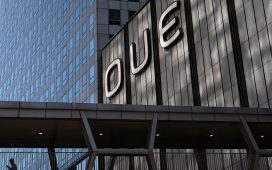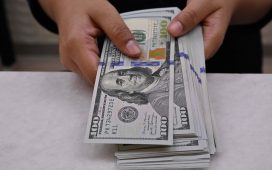TOKYO – SoftBank Group’s flagship Vision Fund has quietly sold off or written down billions of dollars’ worth of its publicly-listed holdings in recent years, a sign of founder Masayoshi Son’s shift away from the venture capital deals that were once an obsession and toward strategic investments in semiconductors and artificial intelligence (AI).
Since the end of 2021, the world’s biggest start-up fund has seen its US-listed portfolio shrink by almost US$29 billion (S$39 billion), as it sold down stakes in companies such as Coupang, DoorDash and Grab Holdings and share prices fell, regulatory filings show. That figure doesn’t include the sale of the Vision Fund’s stake in chip designer Arm Holdings back to SoftBank last year.
The one-time tech kingmaker is now a shadow of its former self, having laid off more than a hundred staff and slowed new investments to a fraction of its past pace.
Mr Son is selling off assets from the fund’s portfolio as he prepares for possible forays into AI and related hardware, said people familiar with the billionaire’s thinking. SoftBank’s equity capital market team has played a central role in monetising the Vision Fund’s sizable stakes with minimal market disruption, said the people.
Many of the investments led by the SoftBank chairman now bypass the Vision Fund and are orchestrated by the holding company. While Mr Son long teased the possibility of a series of Vision Funds launched every two to three years, the prospect of a third Vision Fund – let alone a fourth – no longer comes up, said the people.
Instead, the fund’s reduced staff are mostly caretakers. The equity capital market team is instrumental in detecting the most opportune moments for assets sales, at times through block trades on secondary markets, the people said. They are concentrating on locking in investment gains and reversing any losses.
Mr Son has moved on to new obsessions, inspired in part by the success of Arm. The chip designer’s market value has soared to around US$106 billion since its market debut last year, making SoftBank’s 90 per cent holding worth more than all of SoftBank.
One possible Son project on the horizon: bankrolling a US$100 billion chip venture to compete with Nvidia and supply semiconductors to power the development of AI services. The 66-year-old’s plans remain in flux, the people said.
SoftBank’s shift in strategy also reflects a reset in the broader venture capital market. The two Vision Funds and the Latin America funds together managed committed capital of more than US$160 billion, by far the largest pot of start-up capital ever collected. Staff initially went on the hunt for promising companies requiring investments of a minimum US$100 million – more money than many young companies wanted or could spend effectively.
Instead, in recent months, SoftBank is directly investing in companies it sees as strategically important, in some cases, taking controlling stakes. The firm is in talks to acquire British semiconductor startup Graphcore, Bloomberg reported. Earlier this week, SoftBank led a US$1.05 billion funding round for UK self-driving startup Wayve Technologies, investing along with Nvidia and existing backer Microsoft.
Vision Fund a prolific seller
For all but one of the past seven quarters, the total value of disposals at the Vision Fund has outweighed that of investments, the company’s earnings reports show. In the December quarter, the Vision Fund divested US$2.2 billion of its assets while spending US$90 million on investments.
That’s helped lift SoftBank’s cash pile to 6.2 trillion yen, up from 4.6 trillion yen at the end of 2021. The second Vision Fund still has around US$6 billion to spend, but in practice, the money is Mr Son’s to direct as he pleases, since the second Vision Fund has no external partners, the people familiar with the fund’s management said.
Kirk Boodry, an analyst at Astris Advisory, estimates the two Vision Funds sold at least US$6 billion worth of their holdings in the fiscal year ended March.
“The Vision Fund has been a prolific seller since September,” he said. “A growing cash pile could point to a deeper pivot to generative AI.” BLOOMBERG







